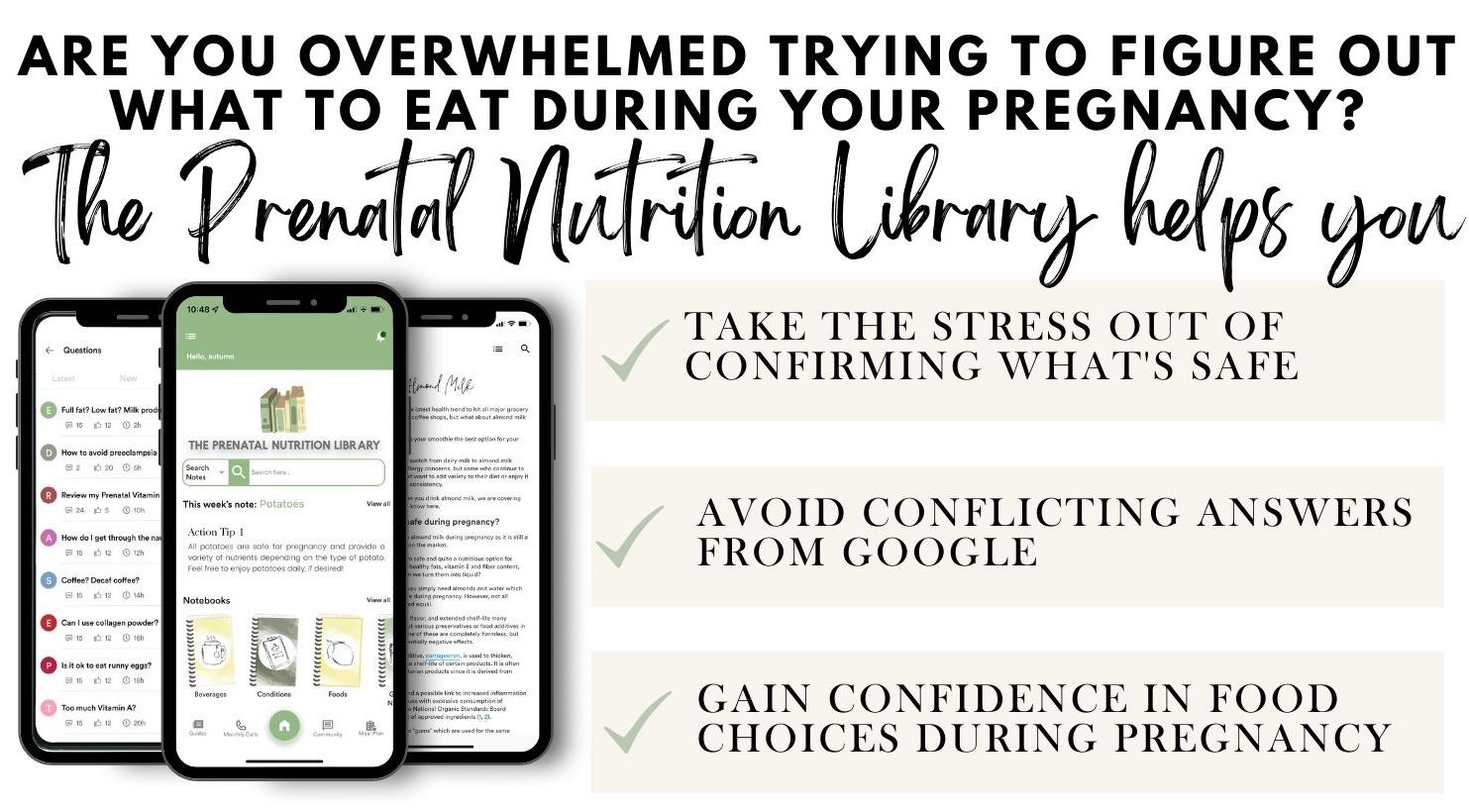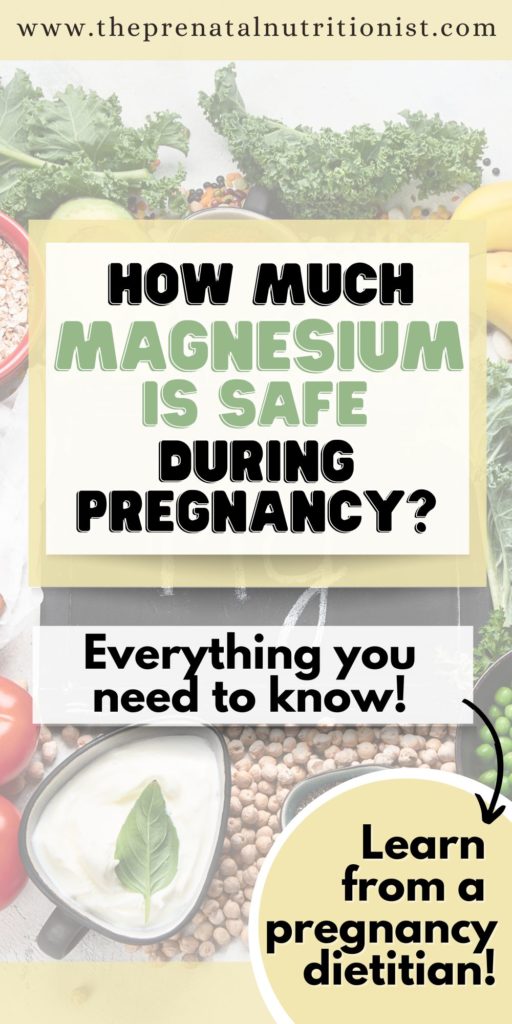
Isn’t this whole pregnancy journey the most magical, mind-blowing adventure? From those first tiny flutters that make your heart leap to those late-night cravings that have you raiding the fridge like a ninja, every twist and turn is unlike any journey you’ve been on before!
But amidst all the glorious wonders and not-so-glorious discomforts, one thing is emphasized often: fueling up with the right nutrients. Choosing nutrient-rich foods and a quality prenatal vitamin becomes your mission. Each nutrient is crucial in keeping you and your little baby happy and thriving.
One mineral in particular that tends to get a lot of praise in the prenatal world is magnesium. This mineral is considered essential. Plus, it may play a role in easing several different pregnancy discomforts and giving your baby a solid foundation to grow on.
But here’s the thing: as wonderful as magnesium is, many of us aren’t getting enough! Many of us could benefit from increasing magnesium intake and, at least, finding a prenatal vitamin with magnesium.
In this post, I will break it all down for you: Can you take magnesium while pregnant? If yes, how much is safe during pregnancy? We’ll also look at some of the best science-backed sources to get the right amount of magnesium from!
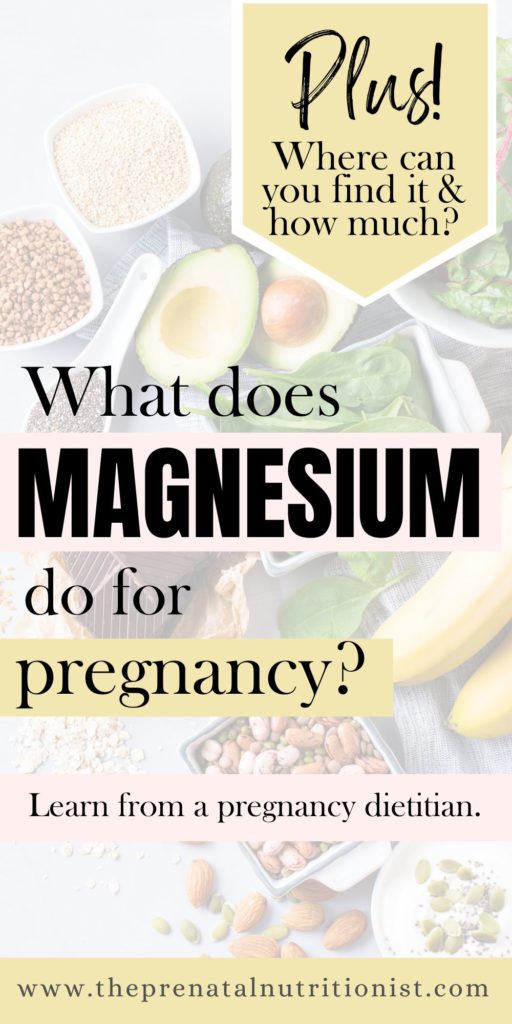
How Much Magnesium Is Safe During Pregnancy?
When pregnant, ensuring you’re nourishing for two is one of the most important things to do. Getting all the essential vitamins, minerals, and macronutrients isn’t just a nice-to-have; it’s an absolute must. Adequate micro and macronutrients support your baby’s growth and development while keeping you feeling your best throughout this incredible journey.
Too little or too much of certain nutrients can potentially lead to complications that can impact your and your growing baby’s health. It’s all about finding that sweet spot that makes you feel your best!
Magnesium deficiency has many possible side effects, which is one reason we encourage paying attention to your intake levels during pregnancy. This includes issues like muscle cramps, fatigue, nausea, and even potentially increasing your risk of preterm birth.
Magnesium is a real multitasker, playing key roles in everything from muscular function to hormone regulation, energy production, and DNA formation. It has its hands in all the big jobs vital for you and your baby’s health. We’ll get into more of the details on those important roles a bit later, but the bottom line is that getting adequate magnesium is non-negotiable.
The experts also agree: a study using the Cochrane Pregnancy and Childbirth Group’s Trials Register found that many expectant mothers, especially those from disadvantaged backgrounds, have magnesium levels lower than the recommended levels. Magnesium deficiency has also been studied for its link to gestational diabetes, preterm birth, preeclampsia, small for gestational age, and intrauterine growth restriction.
What is Magnesium?
Magnesium is the fourth most abundant mineral in our bodies, and it plays a role in over 600 different cellular reactions. Talk about being a major multi-tasker!
From playing a role in keeping our brain power firing on all cylinders to ensuring our hearts are healthy to giving us that extra energy boost during our sweat sessions, magnesium has its hands in all the big jobs that keep us feeling our best.
But here’s where things get extra interesting for us soon-to-be mamas and current mamas. When pregnant, our body needs several essential nutrients increase, and magnesium is no exception.
Magnesium comes in different forms, like oxide, citrate, glycinate, etc. And get this: each type of magnesium gets absorbed a bit differently in our bodies and offers slightly different benefits!
One study suggests magnesium glycinate could be an awesome option for anyone with tummy troubles. Also, magnesium citrate, formed from the reaction between magnesium and citric acid, maybe the answer to preventing kidney stones. However, magnesium citrate produces too powerful a laxative effect for some people.
Unfortunately, despite being so crucial for both our well-being and the well-being of our babies, it’s one of those minerals many people aren’t getting enough of. Many of us just aren’t getting enough from our diets alone, so it’s important to shed some light on this mineral.
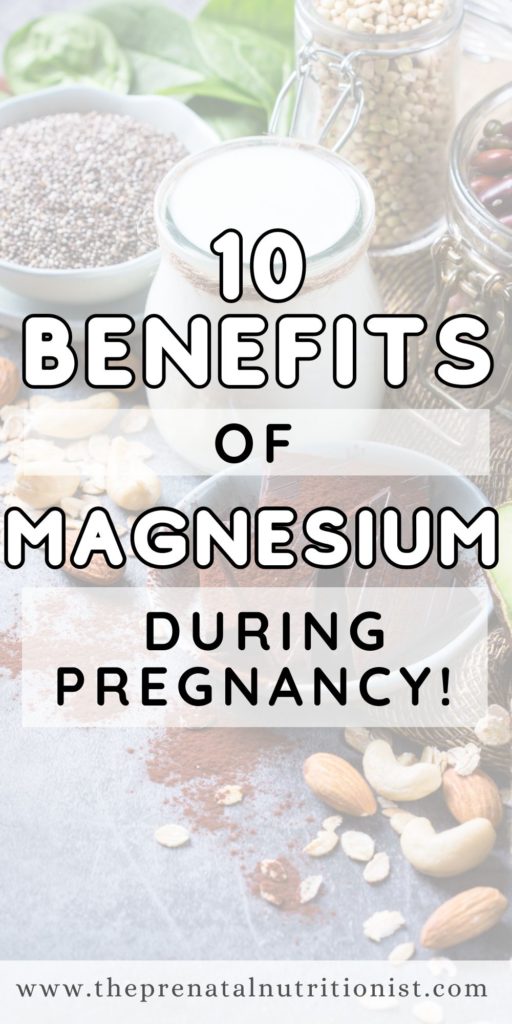
What Does Magnesium Do for Pregnancy
A 2017 randomized controlled trial published in the Journal of Advanced Biomedical Research found many favorable effects of magnesium supplementation during pregnancy, including reducing the risk for complications.
Here are some key benefits of magnesium for pregnancy:
- Reduces the risk of preterm birth
- Helps to support your baby’s growth and reduce the risk of growth restriction
- Supports healthy muscle and nerve function for moms-to-be
- May play a role in reducing the risk or managing gestational diabetes by regulating your blood glucose level
- Helps maintain top-notch immune defenses for both you and your baby to stay healthy and strong
- Promotes proper bone formation, too, and lowers the risk of low birth weight
- Reduces the likelihood of complications like preeclampsia
- Supports cardiovascular health by playing a role in blood pressure regulation
- Contributes to muscle relaxation that may ease muscle cramps, aches, and pains
- Plays a role in the actual DNA and RNA synthesis that’s so crucial for your baby’s cellular growth and development
How Much Magnesium Should I Take During Pregnancy?
Getting enough magnesium during pregnancy is so important, but how much do we actually need? The current Recommended Dietary Allowance (RDA) for magnesium during pregnancy is 350-400 mg/day, depending on age.
The thing to know about RDAs is that they are “best guesses.” Many are set using data from males and put through an equation to give a recommendation for pregnancy versus being based on a lot of research to come to that specific number. Everybody and every pregnancy is different. If you’re experiencing symptoms like leg cramps, headaches, or insomnia, you may very well need more than the RDA. You can’t get too much magnesium from foods. There’s no known toxicity below 5,000 mg of magnesium per day, but it’s always best to consult your healthcare team.
There are several different forms of magnesium pregnant women can choose from. In most cases I recommend choosing magnesium glycinate. It’s highly bioavailable, serves multiple purposes, and tends to be well-tolerated from a digestive standpoint. Depending on your reason for taking magnesium, you may benefit more from a specific form of magnesium.
You can find more information inside The Prenatal Nutrition Library app. The Prenatal Nutrition Library is the one resource you need to find evidence-based preconception and pregnancy nutrition information and recommendations.
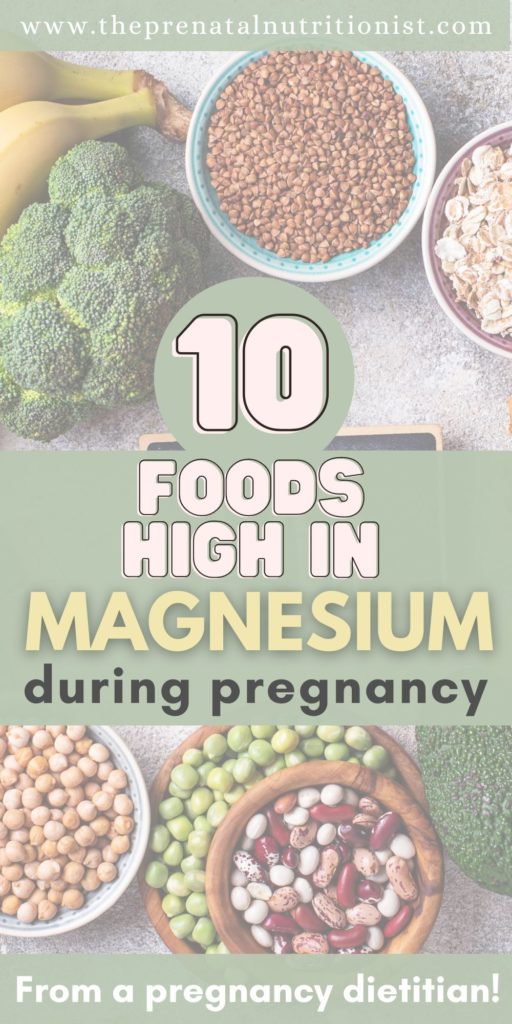
Foods with Magnesium for Pregnancy
Magnesium is an essential nutrient vital to supporting a healthy pregnancy. While supplements can help fill the gap, it’s always best to take a food-first approach whenever possible.
Here’s a rundown of some magnesium-rich foods that are not only pregnancy-friendly but also packed with other vital nutrients:
Almonds
Let’s start with almonds. Not only are they delivering a solid 76 mg of that pregnancy-essential magnesium per 1-ounce serving, but they’re also bringing vitamin E and some fiber to the party. Healthy fats are beneficial, too, for helping your body make the most of those fat-soluble vitamins like A, D, E, and K.
Spinach
This leafy green packs about 78 mg of magnesium per 1/2 cup cooked. But that’s just the tip of the leafy green iceberg! This superfood is also loaded with folate to help prevent neural tube defects and some potassium to support healthy blood pressure and hydration.
Black Beans
This plant-based protein-packed food contains about 60mg of magnesium per 1/2 cup and tons of fiber to support digestion. But there’s more! Black beans also boast antioxidants and anthocyanins that may help curb inflammation.
Dark Chocolate
Not only does this rich, yummy treat contain around 65 mg of magnesium per ounce, but you’re also getting a dose of heart-healthy antioxidants like flavanols. Dark chocolate provides chocolate satisfaction for pregnancy cravings with a nourishing boost. Just be mindful of portion sizes since they still contain sugar that can raise blood sugar levels!
Peanut Butter
Peanut butter provides a very respectable 49 mg of magnesium in just 2 tablespoons. It also has a few grams of protein, vitamin E, and other stellar nutrients. I recommend choosing a ‘natural’, no-sugar-added variety.
Brown Rice
This whole grain is low-key, serving up 42 mg of magnesium per 1/2 cup cooked, along with fiber to combat digestive woes. It also has some vitamin B6, which may play a role in combatting nausea during pregnancy.
Full-Fat Yogurt
Full-fat Greek yogurt is another great option. It offers an impressive 30 mg of magnesium per one-cup serving, plus a calcium, protein, and probiotic punch. You can go a step further and indulge in yogurt parfaits that are topped with fresh fruit, nuts, and seeds for a nutritional boost.
Chia Seeds
These tiny seeds offer a host of nourishment. A single one-ounce portion offers 95 mg of magnesium. Chia seeds are a great topping on yogurt or oatmeal to keep things moving along smoothly in terms of digestion and regular bowel movements.
Banana
With 32 mg of magnesium plus potassium to help prevent leg cramps during pregnancy, vitamin C for immune health, and B6 for a baby’s brain development, the banana is like a nutritional overachiever in fruit form. You can even make banana smoothies with plenty of protein to get your fix!
Milk
If you go for dairy-based milk varieties, you’re looking at 24-27 mg of the mineral, plus a hearty dose of calcium and protein to support strong bones and teeth. Choose full-fat varieties to support satiety, blood sugar balance, and absorption of fat-soluble vitamins!
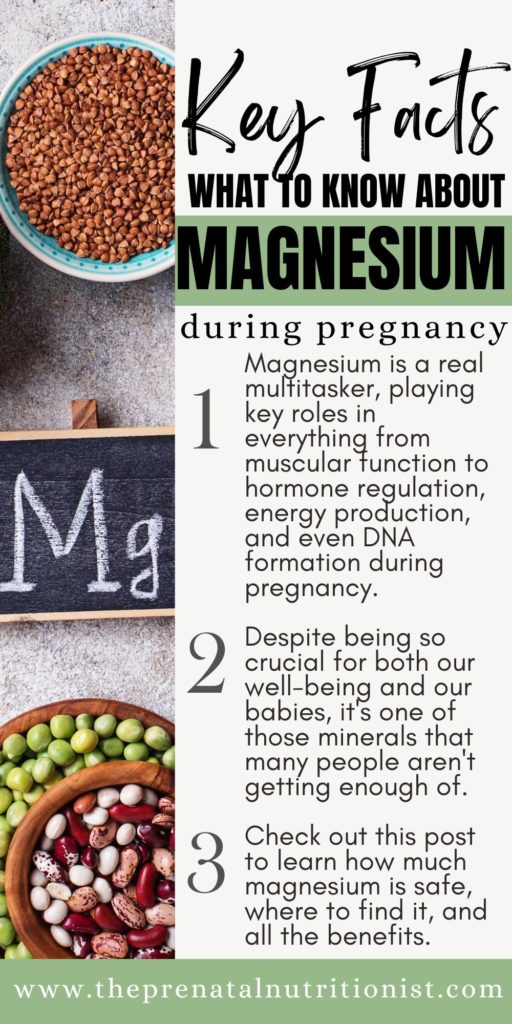
Magnesium is essential to supporting you and your growing baby throughout this incredible journey.
As you can see, getting adequate magnesium from your diet during pregnancy is crucial yet achievable by incorporating magnesium-rich whole foods and supplementation as needed. It can be tough to get an adequate amount of magnesium from your diet alone. Therefore, it is recommended that everyone find a prenatal vitamin with magnesium. Always discuss the addition of a magnesium supplement on top of your prenatal vitamin with your provider or dietitian.
Joining The Prenatal Nutrition Library (TPNL) as a resource can relieve you of the daily stress of what to eat during pregnancy is an absolute game-changer. It’ll help you feel confident in your food choices to let you and your baby thrive.
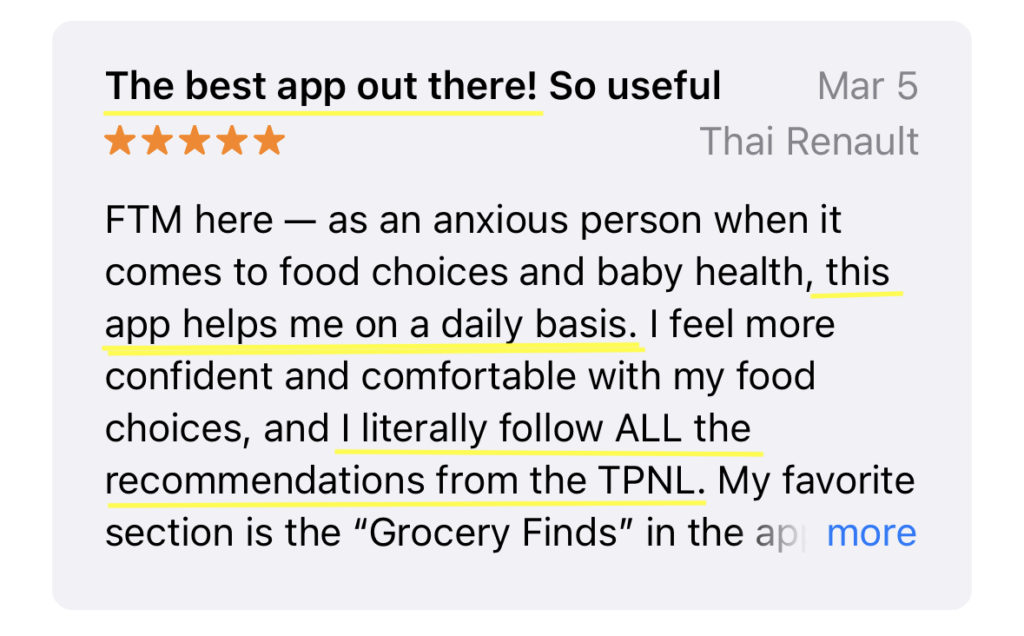
The content inside The Prenatal Nutrition Library app has been created by experienced prenatal dietitian nutritionists. It has realistic, science-backed recommendations and resources to keep you and your baby living your best lives.
Want to try a sample first? Grab our free one-week sample meal plan for pregnancy. It’s packed with meals that are deliciously nourishing and crafted by pros. Navigating pregnancy nourishment doesn’t get any easier than that. See you there!



